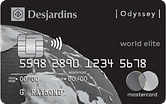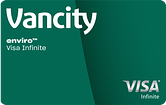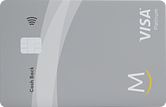Best Credit Union Credit Cards in Canada for 2026
Alternatives to traditional banks.
If you prefer to work with a credit union, as opposed to a big bank, check out the best credit card option offered by a credit union: the Desjardins Odyssey World Elite Mastercard.
Runners up include the SCU Cash Back World Elite Mastercard and SCU World Mastercard.
| Credit card | Annual fee | Average earn rate | Insurance coverage | |
|---|---|---|---|---|
| #1 | Desjardins Odyssey World Elite Mastercard | $130 | 1.48% | 9 types |
| #2 | SCU Cash Back World Elite Mastercard | $120 | 1.75% | 9 types |
| #3 | SCU World Mastercard | $120 | 1.43% | 9 types |
Just like cards from typical banks, the best credit union credit cards provide everything from high cash back rates and premium perks to no annual fees and solid welcome offers. Our unbiased, data-driven Genius Rating system allowed us to narrow down the competition and determine the three top credit cards issued by Canadian credit unions.
The article below reviews these top three credit cards in detail, includes a guide for choosing the right card for your needs, and presents regional credit union cards as extra options, and much more.
Key Takeaways
- The best credit union credit card in Canada is the Desjardins Odyssey World Elite Mastercard.
- The SCU Cash Back World Elite Mastercard and SCU World Mastercard are also excellent credit card options issued by Canadian credit unions.
- Credit union credit cards offer high earn rates, competitive interest rates, and premium credit card features, just like many cards from traditional issuers.
- The best credit union credit card for you likely depends on your provincial options, income level, and rewards preferences.
The best credit union credit cards in Canada
Our Gold award for the #1 credit union credit card in Canada goes to the Desjardins Odyssey World Elite Mastercard for its generous earn rates, unique rewards program, and premium travel features.
Our Silver award goes to the SCU Cash Back World Elite Mastercard for having the highest average earn rate, along with incredible travel perks via the World Elite Mastercard program.
And our Bronze award goes to SCU World Mastercard for its multiple rewards-redemption options, reasonable fee, and easier-to-meet approval requirements.
Despite the benefits these cards offer, it may still be worth researching top credit union cards in your home province. A more local credit union may have features better tailored to your needs. The tradeoff is that not all credit unions are available throughout Canada.
The #1 credit union credit card in Canada: Desjardins Odyssey World Elite Mastercard

You don’t have to be a Desjardins Credit Union member to get the Desjardins Odyssey World Elite Mastercard, but you’ll enjoy even more rewards if you are. The card earns Desjardins BONUSDOLLARS on all purchases, which you can redeem toward gift cards and statement credits – but what sets this rewards program apart is the option to use your cash back as contributions towards certain Desjardins financial products, like insurance premiums or loan payments.
And you'll earn quite a few of those rewards too, considering this card's 1.48% average earn rate.
This credit card doubles as a travel credit card. It includes eight free passes to the Desjardins Odyssey Lounge at the Montreal-Trudeau airport. You’ll also get the peace of mind that comes from having extensive travel insurance, including some of the very best emergency medical coverage for seniors.
The silver-winning credit union card in Canada: SCU Cash Back World Elite Mastercard

Our silver-podium credit union card is the SCU Cash Back World Elite Mastercard, providing top-notch benefits, including a long list of travel insurance coverage. It also has some of the best promotional offers around, including free gas when you rent a vehicle with Hertz, balance transfer offers, and bonus points on select categories.
Earning as much as 4 points per $1 spent, this card has the highest average earn rate of all three cards on our list, coming in at 1.75%.
Cardholders also enjoy luxurious World Elite Mastercard benefits, like personalized concierge services, airport lounge access through Mastercard Travel Pass, and exclusive offers for discounts and rewards from partners. These partner offers can take the form of discounted data plans for international travel, extended free trials for streaming platforms, and/or special rates from tax preparation specialists.
The bronze-winning credit union card in Canada: SCU World Mastercard

Our bronze winner is another SCU card, the SCU World Mastercard. With lower credit score and income requirements, this card is much easier to qualify for than its World Elite sister card, yet it still comes with substantial rewards.
Much of this SCU card's value comes from its solid insurance coverage – 9 types of coverage, including mobile device protection, which is quite rare and worth as much as $63 on its own. According to our study of credit card insurance value, the SCU World Mastercard's insurance package is worth an estimated $530.
One feature that distinguishes this card from competitors is its multiple redemption options for rewards. Users can cash in their Flex Rewards for cash back, merchandise, gift cards, charitable donations, and multiple travel-focused purchases. On the travel side, you can book flights from 100+ airlines, hotel stays, cruises, spa visits, fine dining, and much more.
Compare all top credit union credit cards by Genius Rating
To finalize our list of the top credit union credit cards, we considered credit union cards that are available to most Canadians. While credit unions typically offer banking services in only one province, many extend their credit card offerings to all Canadians – although a few exclude Quebec residents.
Our data-driven Genius Rating identified the best credit cards through its refined, math-based algorithm. This system generates a score out of 5 for all
This is how the best credit union credit cards compare when arranged by Genius Rating:
The Genius Rating methodology
To come up with each card’s Genius Rating, we analyzed over 126 features of each card, broken into seven categories:
- Rewards: 31%
- Fees: 20%
- Insurance: 16%
- Perks: 16%
- Interest: 7%
- Approval: 5%
- Acceptance: 5%
Learn more about our Genius Rating methodology
How to choose the right credit union credit card
When choosing a credit union credit card, remember that each institution has different card offerings and membership eligibility requirements. Aside from that, it can help to consider the same factors that go into a card’s Genius Rating: rewards, fees, insurance, etc.
As suggested above, the rewards structure and earn rates are the most significant factors of credit union cards – but your unique lifestyle and preferences matter just as much.
Rewards
Credit card rewards should be easy for you to earn and provide high value. This chart shows the average earn rates of the top three cards on this list:

For a more detailed look, this table compares how our best credit union credit cards earn rewards, which programs they participate in, and their redemption options:
| Credit card | Rewards program | Rewards | Redemption options |
|---|---|---|---|
| Desjardins Odyssey World Elite Mastercard | Desjardins BONUSDOLLARS | * 3% cash back on groceries * 2% cash back on restaurants, entertainment, travel, and public transportation * 1% cash back on all other purchases | * Statement credits * Contributions towards Desjardins financial products * Gift cards |
| SCU Cash Back World Elite Mastercard | Flex Rewards | * 4 points per $1 spent on groceries and transit * 2 points per $1 spent on recurring bills, streaming, and dining * 1 point per $1 spent on all other purchases | * Statement credits * Bank account deposits * Merchandise * Gift cards * Travel and entertainment bookings * Charitable donations |
| SCU World Mastercard | Flex Rewards | * 3 points per $1 spent on groceries * 2 points per $1 spent on dining and entertainment * 1 point per $1 spent on all other purchases | * Statement credits * Merchandise * Gift cards * Travel and entertainment bookings * Charitable donations |
Tip: No matter what credit card you use, you could be earning bonus cash back on top of your card's rewards. Input your monthly spend in the GeniusCash app, and level up to earn real cash.
Fees
It’s one thing to choose a premium credit card, but another when you have to pay for the privilege of using the card. If you’re considering getting a credit card with an annual fee, be sure to weigh the anticipated benefits of using the card against the card’s cost.
For the most part, the cards on our list charge similar annual fees. The Desjardins Odyssey World Elite Mastercard charges $130, a whopping $10 more than its competitors.
If you're stuck between two cards, it can help to check the nitty-gritty details and compare the smaller, often sneakier credit card fees like these:
- Foreign transaction fees
- Supplemental card fees
- Overlimit fees
- Statement reprint fees
Insurance
Credit cards provide insurance coverage that rivals cards issued by the big banks. However, it’s still a good idea to check that you’re getting the exact insurance coverage you need. And be sure to factor in the value of the associated insurance when deciding whether the card’s annual fee is worthwhile.
The Desjardins Odyssey World Elite Mastercard has the best insurance coverage of the credit union cards on our list, worth an estimated $541.34. It includes 60 days of emergency medical coverage, and this applies to anyone under the age of 75.
Perks
Credit card perks are the features that can really make a credit card stand out. Cards may feature perks like:
- Airport lounge access: Your credit union credit card may include complimentary access to airport lounges, allowing you to relax in a quiet space and grab some food between flights. Even cards that don’t offer free passes may give you access to networks like Priority Pass.
- Concierge service: Many premium cards offer 24/7 complimentary concierge access, which can help with purchasing event tickets, making restaurant or hotel reservations, or accessing unique travel experiences.
- Premium benefits from card networks: Since credit unions partner with card networks like Visa and Mastercard, you can access elite benefits from them. For instance, Visa cards offer Visa Infinite or Visa Infinite Privilege benefits, and Mastercards may have World or World Elite Mastercard benefits.
- Community-centric perks: Some credit unions might partner with charities or non-profits in your province to give back to the community. Credit unions are also more likely to champion environmental causes.
More perks typically mean higher annual fees, but the credit union cards on this list are pretty evenly matched.
Interest rates
Especially if you tend to carry a balance, look for a card with a lower purchase interest rate, or consider one with a low balance transfer rate or a promotion.
Some credit union credit cards offer more competitive interest rates, but our top three picks feature standard interest rates on purchases. This chart shows just how similar the rates are:

Approval
Every time you apply for a credit card, the issuer checks your credit score, which can cause it to temporarily drop. This is why you’ll only want to apply for a credit card when you think you have a good chance of being approved.
For the most part, you’ll need a good credit score of at least 760 for any of these credit union credit cards.
However, card issuers also consider your income when determining eligibility. Both of the World Elite Mastercards on our list require $80,000 personal or $150,000 in household annual income, while the World Mastercard only asks for $60,000 personal or $100,000 annual household income.
Therefore, the SCU World Mastercard has the simplest eligibility requirements, making approval much more likely.
Acceptance
Lastly, you should confirm that your chosen credit union credit card is accepted at your preferred retailers. If you travel, make sure it's accepted internationally too.
This makes the most significant difference when comparing American Express cards to those issued by Visa or Mastercard. But since all of our credit union credit card picks are Mastercards, you shouldn’t have to worry about limited acceptance at all.
Regional credit union credit card options
The best regional card overall is the Vancity enviro Visa Infinite Card, but there are lots of other regional options. Be aware, though, that some of them are available across Canada – you just won’t find physical locations in every province.
British Columbia: Vancity Credit Union
Vancity is known for its community-oriented efforts and support of local businesses.
Its Vancity enviro Visa Classic card with Vancity Rewards only earns 1 point for every $1 spent on travel booked through Vancity Rewards, but Vancity donates 5% of the profits to the Vancity enviroFund – and there’s no annual fee.
Ontario: Meridian Credit Union
Meridian Credit Union touts itself as being people-focused, helping members achieve their best financial goals. The company regularly donates to housing initiatives, community support programs, and climate resilience programs.
Our favourite credit card from this institution is the Meridian Visa Infinite Cash Back Card as it's the most versatile for earning rewards on everyday purchases. You’ll earn up to 4 points per $1 spent on gas and groceries. There is a $99 annual fee, but it’s waived for the first year.
Quebec: Desjardins Credit Union
Part of the Desjardins Group, the largest federation of credit unions in North America, the Desjardins Credit Union has an extensive network and is well-rated for its customer service.
Obviously, the Desjardins Odyssey World Elite Mastercard is our favourite card from this institution, but the Desjardins Cash Back World Elite Mastercard makes for a solid alternative. With earn rates and insurance package similar to the Odyssey card's, this card is a valuable option if you want to save a bit on the annual fee.
If you prefer a Visa pick, look at the Desjardins Odyssey Visa Infinite Privilege. Although it’s touted as a travel card, you’ll earn up to 4% back on transit, entertainment, and restaurants (and 3% back on travel and groceries), making it a great everyday credit card.
Alberta: Servus Credit Union
Although Servus Credit Union is one of the newer credit unions we looked at, it has an extensive branch network focused on serving its community members. Servus doesn’t have a long list of credit cards. The four personal cards they offer range from basic to premium, so the best card for you depends on your income and ability to pay an annual fee.
If you want a basic card with reasonable eligibility requirements and a low annual fee, check out the Servus No Fee Mastercard. It’s a simple option that earns limited rewards, but won’t cost you anything to keep in your wallet. If you don’t mind paying an annual fee, the Servus World Elite Mastercard is your best bet. It earns decent rewards and includes the standard perks and benefits of World Elite Mastercards.
Atlantic Canada: Atlantic Edge Credit Union
People who were members of EasternEdge Credit Union, Atlantic Edge Credit Union, and Hamilton Sound Credit Union are familiar with Atlantic Edge Credit Union, the credit union formed by the merger of these three Atlantic credit unions.
You have seven Mastercard options through Atlantic Edge, but we like the Atlantic Edge Cash Back World Elite Mastercard. There is a $120 annual fee, but the rewards for this card quickly make up for it – you’ll earn up to 4 points per $1 on groceries and sustainable transit, while your remaining spending earns between 1 and 2 points per $1.
Why choose a credit union credit card?
If you're already a credit union member, you likely appreciate the community-driven values and member-first approach that set credit unions apart. Unlike big banks, credit unions are not-for-profit institutions – meaning their goal is to serve members, not shareholders. This often translates into lower fees, better service, and access to unique local perks.
Credit union credit cards carry those same advantages. They typically offer lower interest rates on both purchases and cash advances compared to traditional bank-issued cards. Many are also connected to national networks like The Exchange or Acculink, giving you convenient access to funds when you need them – whether you're close to home or travelling.
Choosing a credit union credit card is not only a smart financial move, but it’s also a way to support your local economy while enjoying competitive rates and personalized service.
Why choose a credit union at all?
Let’s start with one of the most important reasons: credit unions are non-profit. Instead of being operated like a business owned by shareholders, the credit union is operated using funds from its members.
This means they have their members’ interests at heart, offering more competitive interest rates, fewer fees, and an active presence in their communities. Credit unions also take pride in providing more personalized customer service.
That said, credit unions are usually limited to serving a single province, which can be an issue if you frequently travel across the country. They may also lag slightly behind in terms of technological offerings, such as mobile apps.
The top 3 credit unions in Canada are:
- Coast Capital Savings: 45 locations, based in British Columbia
- Vancity: 50+ locations throughout British Columbia
- Servus: 140+ locations within Alberta
Guide to credit union credit cards
If you’re not familiar with credit card offerings from credit unions, keep reading for a quick primer on what you need to know.
Credit union credit cards vs. bank credit cards
On the surface, a credit union credit card looks the same as a credit card issued from any bank. And truth be told, there's really no difference – they use the same networks and offer varying levels of rewards and insurance in exchange for annual fees and interest rates.
But credit union credit cards can be handy if you already do your everyday banking at a credit union – it allows you to keep your financial products in one place. Credit unions can also offer specialized ways to earn or use rewards that big banks don’t provide.
How to get a credit union credit card
Applying for a credit union credit card is similar to getting a regular credit card, with a couple of exceptions:
- You typically need to be a member of the credit union
- You may need to visit a branch in person to complete the application (though this isn’t true in all cases)
Once you fill out a credit union credit card application, you’ll usually get a decision pretty quickly – and your card soon after that.
FAQ
What is the best credit card from a Canadian credit union?
The Desjardins Odyssey World Elite Mastercard is the best credit union credit card in Canada. Issued by Desjardins Credit Union, with its extensive cross-country network, this card boasts high earn rates for its valuable Desjardins BONUSDOLLARS, premium World Elite Mastercard perks, and a generous insurance coverage – one that's especially beneficial for seniors who like to travel.
Do credit unions have the best credit cards?
While our list of the best overall credit cards in Canada doesn't include any credit union options, the quality of card issued by these institutions is undeniable. Not only does the top credit union card come from Desjardins (the Desjardins Odyssey World Elite Mastercard), but the Desjardins Flexi Visa is one of Canada's best low interest credit cards.
Which credit union is the best in Canada?
The best credit union in Canada is Coast Capital Savings. This community-focused institution is based in British Columbia with approximately 45 locations serving 600,000 members. Some of its financial products are available to clients across the country, including its popular account, the Coast Capital Elevate Chequing Account.
Can you build credit with a credit union?
Yes, you can build credit with a credit union. These institutions provide credit-building tools like personal loans, credit cards, and lines of credit that report your payment activity to Canada's credit bureaus. Through timely bill payments and responsible account management, you can establish a positive credit history and improve your credit score over time.

































